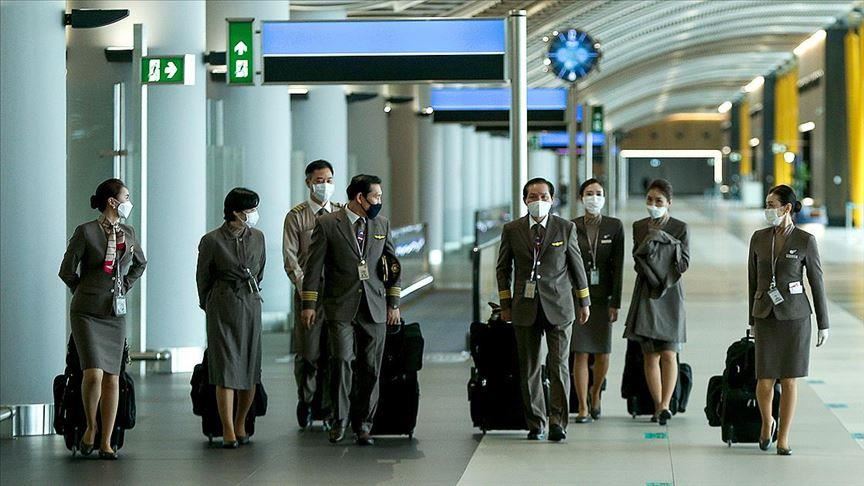
ANKARA
The global coronavirus outbreak will have a much deeper dampening effect on the world aviation sector than previous disease scares, warned analysts.
Suat Hayri Aka, Turkey’s ambassador to the Montreal-based International Civil Aviation Organization (ICAO), said that airlines’ suspensions of busy cargo and passenger traffic with China will hurt both civil aviation and the economy at large.
The cancellation of 6,000-7,000 flights from 10 busy Chinese airports – the vast majority of them domestic flights – will take a hit on China's civil aviation and economy for some time, he told Anadolu Agency.
From ground zero in Wuhan, China, coronavirus has spread to more than 20 countries worldwide, including Japan, South Korea, Thailand, the U.S., Singapore, France, Russia, Spain, Vietnam, Malaysia, Cambodia, Sri Lanka, the Philippines, India, and Canada.
Citing the latest data, Aka noted that the number of flights taking off from airports in the normally busy hubs of Beijing, Shanghai, Chengdu, Shenzhen, and Xian fell nearly in half in just a day, with flights from Wuhan scrapped altogether.
"Flight suspension of airlines in countries which have busy cargo and passenger traffic with China, such as the U.S., U.K., Germany, France, Canada, Indonesia, and Turkey, like China, will affect the whole world’s civil aviation and economy," he stressed.
He said cooperation between governments and healthcare organizations will be key to stopping the virus.
"The ICAO launched an information exchange platform called Collaborative Arrangement for the Prevention and Management of Public Health Events in Civil Aviation (CAPSCA) to assist in the coordination of the international response to such cases," he explained.
Lessons from previous outbreaks
Judging from previous cases – like the SARS (2003) and bird flu (2017) epidemics – Aka said when travel restrictions are imposed due to contagious outbreaks, demand for air travel falls.
The global aviation sector’s losses from the 2003 SARS outbreak are estimated at $10 billion, he said, adding: "Today, the number of air passengers in China alone is tenfold."
Regional airlines had to reduce their service capacity by a third due to SARS, shaving 3% from the global aviation industry’s revenue, he said.
"It’s not really difficult to predict the effect of this on other aviation-related sectors, plus the possible negative consequences on the economy, especially in tourism, construction, and food," he warned.
On a more optimistic note, he said: "As soon as the fear of transmitting this disease to the world was overcome, the civil aviation industry regained momentum within two months, and returned to its level from before the crisis within six."
Aka said the financial impact of a huge government like China battling the virus will be felt on global retail markets.
"Chinese intermediate goods and products are undoubtedly the input of major economies transporting via air and sea," he explained. “So this interdependence affects the entire world economy.”
No one can know how far the virus will spread, or how much it will impact aviation, he added.
Sensitive to shocks
Aviation expert Abdullah Nergiz, the editor-in-chief of Havayolu101, an airline industry website, pointed to civil aviation’s vulnerability to external shocks.
"Political tensions, economic crises, regional conflicts, and even volcano eruptions leave deep marks on the sector," he explained.
Citing SARS’ impact on Asia-Pacific-based airlines in 2003, resulting in a capacity loss of 35% and $6 billion in revenue losses, Nergiz said:
"Coronavirus' possible costs will be much higher, as it spreads much faster, plus the aviation sector's volume is much higher now."
He stated that the cargo business will also take a blow, as production will be disrupted due to people stuck in quarantine.
"If a solution can’t be found in the short term, we estimate that airlines' turnover will take a hit of $15-20 billion." Nergiz said.
Tolga Ozbek, general coordinator of a sector website kokpit.aero, stressed that back when it was the preferred method to transport goods, disease outbreaks used to be spread by ship, not air.
“Now air carriers are an important factor,” he said.
Noting that China and the Far East are the world’s fastest-growing aviation markets, Ozbek said: “This time airlines will face much bigger losses than with SARS because there was not such a huge quarantine or cancellation of flights.”
Anadolu Agency website contains only a portion of the news stories offered to subscribers in the AA News Broadcasting System (HAS), and in summarized form. Please contact us for subscription options.


